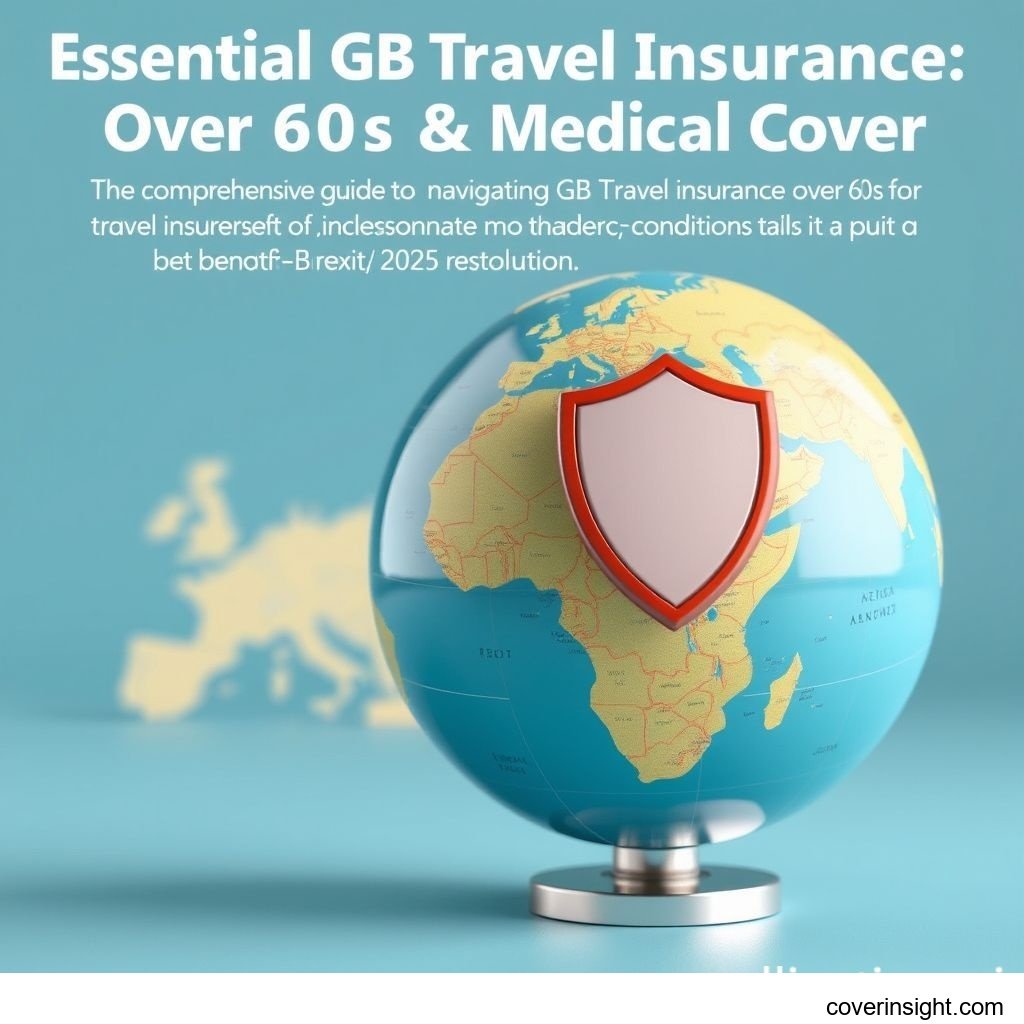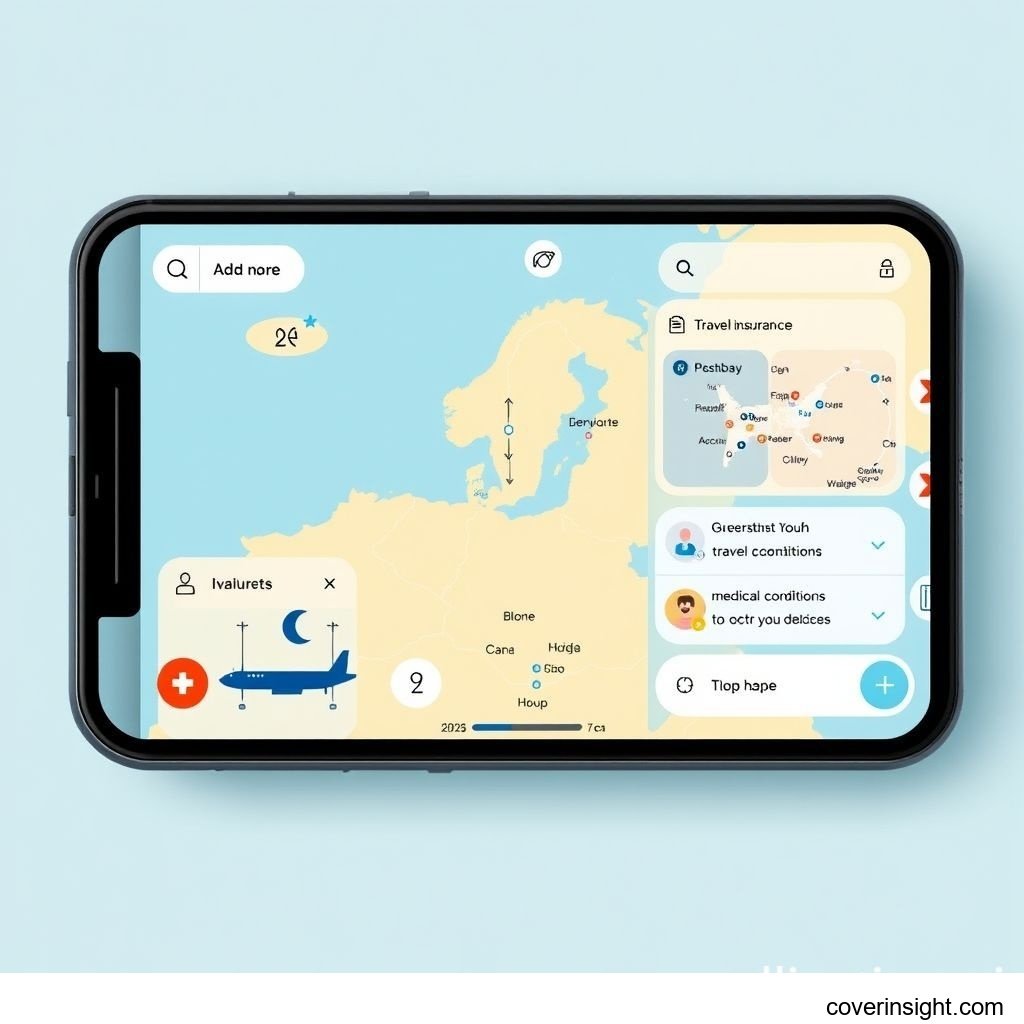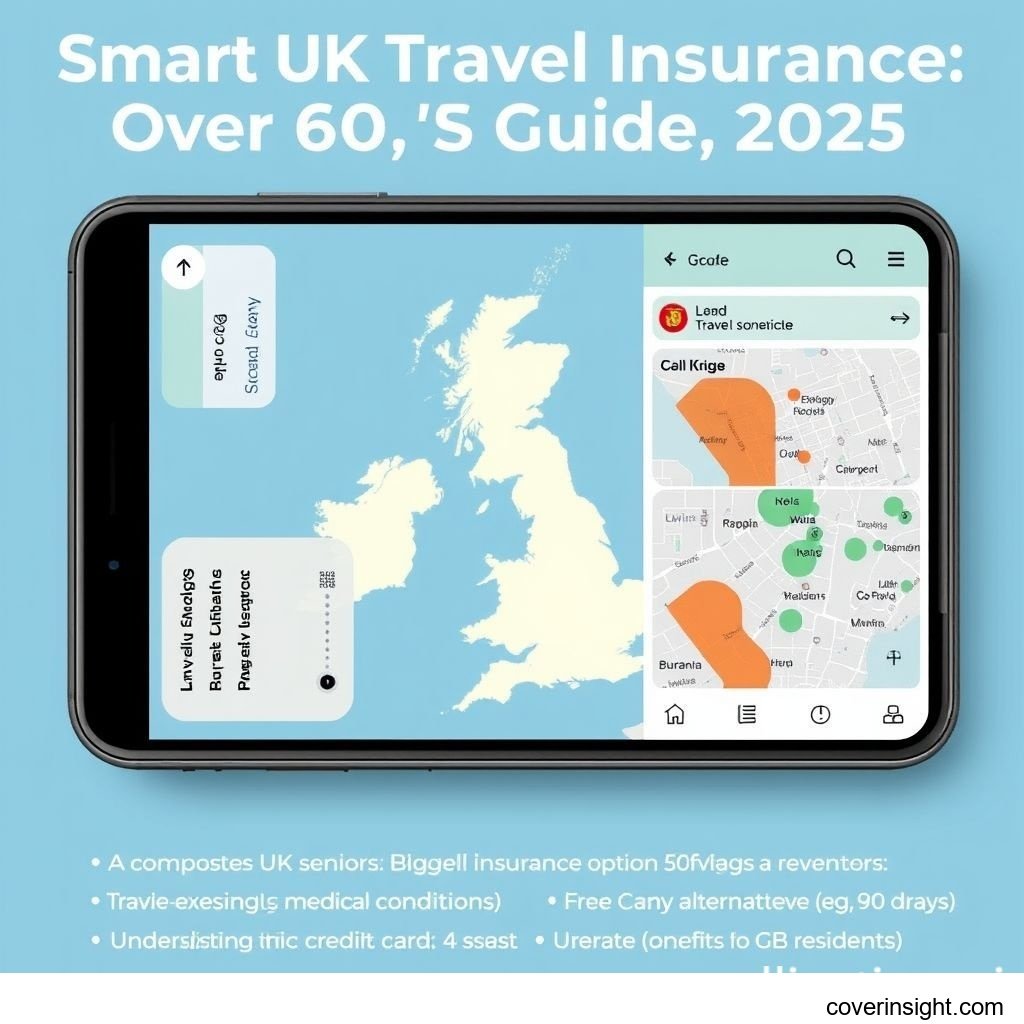Introduction
As 2025 approaches, planning for travel within Great Britain takes on a renewed sense of excitement. For individuals over 60, ensuring peace of mind during their adventures is paramount, and this often begins with robust travel insurance for over 60s. While domestic travel might seem less risky than international trips, unforeseen circumstances can still arise, from medical emergencies to unexpected cancellations or lost luggage. A tailored insurance policy isn't just a safety net; it's an essential component of responsible travel planning, providing crucial financial protection and support when you need it most. Navigating the options available for seniors can be complex, but understanding the core components and key considerations will empower you to choose the best coverage for your specific needs.
Coverage Details
Understanding what your policy includes and, crucially, what it doesn't, is vital when selecting travel insurance for over 60s. Comprehensive coverage is designed to protect you from a wide array of potential disruptions, ensuring your journey remains stress-free, even if things don't go according to plan.
What’s Included
A good travel insurance policy for seniors will typically offer a range of benefits designed to cover common travel mishaps. These often include:
-
Medical Emergency Expenses: This is perhaps the most critical component, covering costs for emergency medical treatment, hospital stays, and ambulance services if you fall ill or are injured while travelling within GB. It can also include repatriation costs if you need to be transported home for further care.
-
Trip Cancellation and Interruption: Reimburses non-refundable expenses if your trip is cancelled or cut short due due to unforeseen events like illness, injury, or the death of a family member.
-
Baggage Loss, Delay, or Damage: Provides compensation for lost, stolen, or damaged luggage and personal belongings, including essential items you might need to purchase if your bags are significantly delayed.
-
Personal Liability: Covers legal costs and compensation if you accidentally cause injury to another person or damage their property during your trip.
-
Travel Delay and Missed Departure: Offers compensation for additional expenses incurred due to significant travel delays, such as accommodation or alternative transport costs.
-
24/7 Emergency Assistance: Access to a helpline that can provide advice, arrange medical services, or assist with other emergencies while you are away.
Common Exclusions
While policies aim to be comprehensive, there are always situations not covered. Being aware of these common exclusions is just as important as knowing what's included:
-
Pre-existing Medical Conditions (Undisclosed): If you have a medical condition and do not declare it during the application process, any claims related to that condition will likely be denied. Always be honest and thorough.
-
Risky Activities: Participation in certain high-risk sports or activities (e.g., rock climbing, certain water sports) might be excluded unless specifically added as an optional extra.
-
Alcohol or Drug-Related Incidents: Claims arising from incidents where you were under the influence of alcohol or non-prescribed drugs are typically excluded.
-
Self-Inflicted Injury: Injuries resulting from intentional acts, including self-harm or suicide attempts, are not covered.
-
Travel Against Medical Advice: If a medical professional has advised against travel due to your health condition, and you travel nonetheless, your policy may be invalidated.
-
Government Warnings: Travelling to areas against the advice of the Foreign, Commonwealth & Development Office (FCDO) or local authorities can invalidate your cover. While this is less common for GB domestic travel, it's worth noting.
Cost Analysis
Understanding the factors that influence the cost of travel insurance for over 60s is crucial for budgeting and finding the most suitable policy. Premiums can vary significantly, depending on a range of personal and trip-specific details.
Price Factors
Several key elements contribute to the overall premium you will pay for your travel insurance for over 60s:
-
Age: Generally, as you get older, the cost of insurance tends to increase. This is primarily due to the higher statistical likelihood of medical claims.
-
Pre-existing Medical Conditions: This is often the biggest determinant of cost. Insurers assess the risk associated with declared conditions, and more severe or numerous conditions can lead to higher premiums. Conditions like heart disease, diabetes, or cancer will significantly impact the price.
-
Duration of Trip: Longer trips typically incur higher premiums, as there's more time during which an incident could occur.
-
Type of Policy: Single-trip policies are for one specific journey, while annual multi-trip policies cover all trips within a 12-month period. For frequent travellers, an annual policy can often be more cost-effective.
-
Level of Coverage: Opting for higher limits on medical expenses or more comprehensive cancellation cover will naturally increase the premium.
-
Excess Amount: The excess is the amount you agree to pay yourself towards any claim. Choosing a higher excess can reduce your upfront premium, but means you'll pay more out-of-pocket if you need to make a claim.
Saving Tips
While managing the cost of travel insurance for over 60s can be a concern, there are several strategies to help you secure affordable yet adequate coverage:
-
Compare Multiple Quotes: Never settle for the first quote you receive. Use comparison websites and direct insurers to get a broad view of the market. Different providers specialise in different demographics or conditions, so prices can vary wildly.
-
Consider Annual Policies: If you plan on taking multiple trips within a year, an annual multi-trip policy often proves more economical than purchasing several single-trip policies. This can also save time and effort.
-
Adjust Your Excess: As mentioned, opting for a higher voluntary excess can lower your premium. Ensure you are comfortable with the amount you would need to pay if a claim arises.
-
Look for Family Plan Discounts: If you are travelling with a partner or other family members, many insurers offer family plan discounts when purchasing a single policy that covers everyone. This can be a significant saving compared to individual policies.
-
Review Your Needs: Avoid paying for cover you don't need. For instance, if you're not participating in adventure sports, don't pay for an add-on that covers them.
-
Declare All Medical Conditions Accurately: While it might seem counterintuitive, hiding medical conditions can invalidate your policy, leading to significant out-of-pocket expenses later. Being transparent from the start ensures your policy is valid. For more detailed guidance, consult resources from the Financial Conduct Authority on consumer rights in insurance.
Choosing the Right Policy
Selecting the ideal travel insurance for over 60s requires careful consideration of your specific travel habits and personal circumstances. It's not just about the price; it’s about finding a policy that truly aligns with your needs.
Assessing Your Needs
Before you even start comparing policies, take time to assess what kind of cover you genuinely require:
-
Single Trip vs. Annual Multi-Trip: For infrequent travellers, a single-trip policy makes sense. However, if you plan to explore GB more than twice a year, an annual multi-trip policy for travel insurance for over 60s is usually more cost-effective and convenient.
-
Destination-Specific Coverage: While this article focuses on GB, some policies might offer different levels of cover depending on whether you're staying local or venturing further afield. Ensure your policy explicitly covers travel within Great Britain.
-
Activity Level: Do you plan on gentle walks or more strenuous activities? Confirm that your chosen policy covers any specific activities you intend to pursue, such as cycling, hiking, or golf.
Understanding Policy Wording
The devil is often in the detail, especially with insurance. It’s crucial to delve into the policy wording:
-
Read the Fine Print: Pay close attention to the terms and conditions, as well as the definitions of key terms. Understand what "unforeseen" means in the context of cancellations or medical emergencies.
-
Check Limits and Sub-Limits: Policies have overall limits (e.g., £10 million for medical expenses) but also sub-limits for specific items (e.g., £500 for a single item of luggage). Ensure these align with the value of your belongings and potential medical costs.
-
Understand Excesses: Clearly know the excess amount you would need to pay for each type of claim. A higher excess means a lower premium, but a larger out-of-pocket expense if you claim.
Considerations for Pre-existing Conditions
For many over 60, pre-existing medical conditions are a primary concern when seeking travel insurance for over 60s.
-
Declare Everything: It cannot be stressed enough: declare every single medical condition, no matter how minor it seems, that you have been diagnosed with or treated for. Failure to do so could lead to a claim being rejected.
-
Specialist Insurers: If you have multiple or serious pre-existing conditions, you might find better and more affordable cover with specialist insurers who cater specifically to seniors with complex medical histories. They have more experience assessing and pricing such risks.
-
Medical Screening Questions: Be prepared for detailed medical screening questions. Answer them accurately and honestly. Some insurers use an automated system, while others might require a phone consultation.
Special Considerations for Over 60s
The specific needs of older travellers often go beyond standard considerations, requiring a more nuanced approach to choosing travel insurance for over 60s.
Navigating Medical Disclosures
The process of disclosing medical information can feel daunting, but it's a cornerstone of valid travel insurance for over 60s.
-
Honesty is Key: Any omission, even if unintentional, can lead to your policy being invalid when you need it most. This could leave you personally responsible for substantial medical bills.
-
Medical & Age-Related Protection (MAP) System: Some insurers use a system like the MAP system, a standardised set of questions designed to accurately assess medical risks. This helps ensure fair pricing and appropriate coverage.
-
GP Letter: While not always required, having a letter from your GP confirming your fitness to travel can be beneficial, especially if you have complex medical needs or are travelling against recent medical advice.
The Role of Credit Card Travel Insurance
Many people wonder if their bank or credit card provides sufficient cover. While some premium cards offer credit card travel insurance, it's vital to understand its limitations for travel insurance for over 60s.
-
Check the Small Print: Credit card travel insurance often has age limits (e.g., typically ceasing cover at age 65 or 70), lower medical limits, and fewer provisions for pre-existing conditions compared to dedicated policies.
-
Activation Requirements: Some credit card travel insurance policies require you to pay for your trip using that specific card to activate the cover.
-
Gap Coverage: Even if your credit card offers some cover, it might not be comprehensive enough, particularly for medical emergencies. You may need to purchase an additional, top-up policy to fill any gaps. It's crucial not to rely solely on this without thoroughly reviewing its terms.
Family Travel and Group Policies
Travelling with family, especially adult children or grandchildren, opens up opportunities for streamlined insurance solutions and potential family plan discounts.
-
Bundling Benefits: Many insurers offer single policies that cover multiple family members. This simplifies the application process and can often result in family plan discounts compared to buying individual policies.
-
Age Limits on Family Policies: While convenient, be mindful of any upper age limits on "family" policies. Some might only cover children up to 18 or 21, even if they are still financially dependent.
-
Shared Responsibility: When using a family policy, ensure all members are aware of the policy details, emergency contacts, and how to make a claim.
The Application Process
Securing your travel insurance for over 60s is a straightforward process once you've determined your needs. Knowing what to expect can make it even smoother.
Online vs. Broker
You have two primary avenues for purchasing travel insurance for over 60s:
-
Online Platforms: Comparison websites and direct insurer websites offer convenience and the ability to compare multiple quotes quickly. This is often the most popular route for those comfortable with digital processes.
-
Insurance Brokers: A broker offers a personalised service, particularly beneficial for those with complex medical histories or unique travel plans. They can search the market on your behalf, negotiate terms, and explain intricate policy details, ensuring you get bespoke travel insurance for over 60s. For expert advice, consider consulting a registered broker listed by the Association of British Insurers.
Required Information
Be prepared to provide the following details when applying for travel insurance for over 60s:
-
Personal Details: Name, address, date of birth for all travellers.
-
Trip Details: Destination (GB in this case), departure and return dates, purpose of trip.
-
Medical History: A comprehensive list of all pre-existing medical conditions, including dates of diagnosis, medications, and any past surgeries or treatments for all insured individuals.
-
Current Medications: A list of all prescribed medications.
-
Previous Claims History: Any past travel insurance claims you have made.
What Happens Post-Purchase
Once your policy is confirmed, ensure you have easy access to your documents:
-
Policy Documents: You will receive your policy schedule and wording via email or post. Read them thoroughly to confirm all details are correct.
-
Emergency Contact Information: Make sure you have the insurer's 24/7 emergency assistance number saved in your phone and on a physical card in your wallet. Share it with your travel companions.
-
Digital Copies: Store digital copies of your policy on your phone or in cloud storage for easy access.
FAQs
Here are some frequently asked questions regarding travel insurance for over 60s:
How much does travel insurance for over 60s cost?
The cost of travel insurance for over 60s varies widely, typically ranging from £20 for a basic single GB trip for a healthy individual, to several hundred pounds for an annual policy covering multiple pre-existing medical conditions. The average cost can fall between £50-£150 for a comprehensive annual policy, but this is highly dependent on individual circumstances.
What affects premiums?
Premiums for travel insurance for over 60s are primarily influenced by age, the number and severity of declared pre-existing medical conditions, the duration and type of trip (single vs. annual), and the chosen level of coverage.
Is it mandatory?
While travel insurance for over 60s is not legally mandatory for domestic travel within GB, it is highly recommended. Without it, you would be personally responsible for potentially significant costs, such as emergency medical treatment, repatriation, or trip cancellation fees, which could amount to thousands of pounds.
How to choose?
To choose the best travel insurance for over 60s, first assess your specific needs, including trip frequency, planned activities, and most importantly, accurately disclose all pre-existing medical conditions. Then, compare quotes from multiple providers, paying close attention to medical cover limits, exclusions, and customer service reviews. Ensure the policy is explicitly designed for travel within Great Britain. You can also explore general Insurance Resources Global.
Consequences of no coverage?
Without travel insurance for over 60s, the consequences of an unforeseen incident can be severe. If you suffer a medical emergency, you would bear the full cost of ambulance services, hospital stays, and any necessary follow-up treatment, which can be expensive even within the NHS if private care is sought or if you need to be repatriated to your home. Additionally, you would lose any non-refundable expenses if your trip is cancelled or interrupted, and there would be no compensation for lost or damaged luggage. It’s always best to be prepared before you leave your GB Insurance Home.








Comments